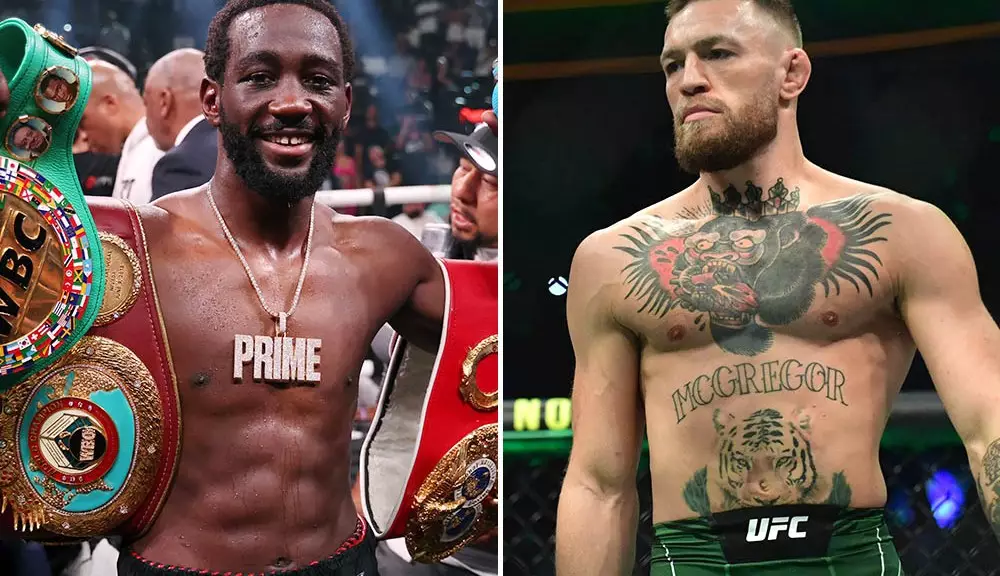In a landscape where boxing and mixed martial arts increasingly seem to overlap, the potential crossover fight between boxing champion Terence Crawford and MMA luminary Conor McGregor captured significant attention. With conversations reportedly taking place about a dual-format showdown—one bout in boxing and another in the cage—both fighters could have benefited immensely from this intersection of fanbases and financial incentives. However, despite initial discussions, Crawford made it clear that he would not be jumping into the octagon for a one-off MMA bout.
Crawford, who boasts an undefeated record of 40-0 and is a four-weight world champion, harbors no delusions about the complexities entailed in switching from boxing to MMA. During a recent live stream interview, he shared candid insights about his conversations with McGregor, emphasizing the inherent dangers of entering the octagon. “I’m not getting in no f*cking octagon with you,” Crawford remarked, underscoring the physicality and the skill set required for MMA fighting. His refusal was not merely an aversion to discomfort but carried the weight of a strategic decision aimed at preserving his legacy within the boxing realm.
What stands out here is the acknowledgment from both athletes of their respective domains; Crawford understands that a foray into MMA, regardless of the allure of wealth, could derail his career built on pugilistic skills—a skill set that would likely place him at an immediate disadvantage against McGregor’s diverse arsenal. The discussion illuminated mutual respect between the two champions, as both recognized that moving into one another’s worlds could lead to unforeseen complications.
Despite Crawford’s solid financial standing in boxing—evident by his successful recent bout against Israil Madrimov, as he seeks future fights against big names like Canelo Alvarez—McGregor attempted to sway him towards the octagon by highlighting the lucrative opportunities that such a crossover fight could generate. “But we’ll make a sh*t ton of money!” McGregor argued, implicitly suggesting that financial incentives might outweigh the risks involved.
However, Crawford’s response was inherently philosophical, showcasing a deeper understanding than the immediate monetary gains. “Yeah, sometimes it ain’t about the money,” he concluded, reflecting a commitment to his craft that values legacy over potential earnings. In a sport where injuries can spell the end of a promising career, the risk of fighting in a new format led to a clear decision for the boxing champion.
The contrast between the boxing and MMA worlds was starkly evident as Crawford weighed his options. On one hand, a crossover with McGregor could have mimicked the success of Floyd Mayweather’s long-anticipated bout with McGregor in 2017, which raked in significant profits for both fighters. On the other hand, Crawford’s pathway has been about cementing his legacy in boxing.
As he looks to unify titles in the 154-pound category and aims for a mega-fight with Canelo, Crawford’s choice reflects a strategic vision: to ensure his achievements remain undisputed in their respective sport while resisting the temptations of money-laden, albeit risky, fights.
While Conor McGregor has remained largely silent in terms of competitive fights since his significant injury at UFC 264 in July 2021, speculation continues regarding his return. His role as a coach on “The Ultimate Fighter” rekindles interest in his fighting future but leaves fans uncertain about when he will be ready to compete again.
For Crawford, options abound. He may soon face Sebastian Fundora, a matchup that promises to be pivotal in his quest to accumulate titles, providing a substantial platform for his continued dominance in boxing. Indeed, the paths of Crawford and McGregor will undoubtedly continue to draw intrigue and speculation from fans and analysts alike, but their decisions in the ring and octagon illustrate the balance between risk and legacy that defines each athlete’s career—one that isn’t swayed merely by the prospect of profit but by a deeper commitment to their craft.

